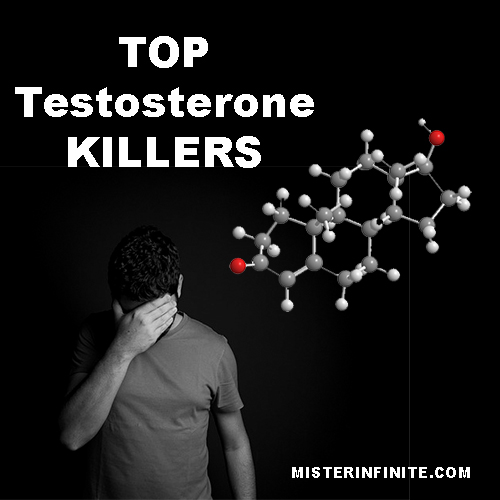Testosterone, often dubbed the “king of hormones” in men, plays a crucial role in various aspects of male health and well-being.
From muscle mass and bone density to libido and mood, testosterone influences numerous physiological processes.
However, in today’s modern world, several factors can significantly impact testosterone levels, leading to a range of health issues.
In this comprehensive article, we delve into the biggest testosterone killers, shedding light on the factors that affect male hormone levels and exploring strategies to mitigate their effects.
1. Sedentary Lifestyle:
One of the primary culprits contributing to declining testosterone levels in men is a sedentary lifestyle.
Regular physical activity is essential for maintaining healthy testosterone levels.
However, with the rise of:
- Desk jobs
- Increased screen time
- And sedentary leisure activities
many men are leading increasingly inactive lives.
Lack of exercise not only leads to weight gain and obesity but also disrupts hormonal balance, including testosterone production.
2. Poor Diet and Nutritional Deficiencies:
Dietary habits play a significant role in testosterone production.
A diet lacking in essential nutrients like:
can negatively impact testosterone levels.
- Processed foods
- Sugary snacks
- And excessive alcohol consumption
contribute to inflammation and insulin resistance, further suppressing testosterone production.
Incorporating:
- Whole foods
- Lean proteins
- Healthy fats
- And plenty of fruits and vegetables
into the diet can help support optimal hormone levels.
3. Chronic Stress:
Stress has become an inevitable part of modern life, but its prolonged effects can wreak havoc on hormone levels.
When the body is under stress, it releases cortisol, a hormone that helps cope with the stressful situation.
However, chronic stress leads to elevated cortisol levels, which can suppress testosterone production.
Moreover, stress impacts sleep quality, further exacerbating hormonal imbalances.
Implementing stress-reduction techniques such as:
- Mindfulness
- Meditation
- And regular exercise
can help manage cortisol levels and support testosterone production.
4. Inadequate Sleep:
Quality sleep is vital for overall health and well-being, including hormonal balance.
During sleep, the body undergoes crucial repair and regeneration processes, including hormone production.
Sleep deprivation or poor sleep quality disrupts this delicate balance, leading to decreased testosterone levels.
Additionally, disrupted sleep patterns affect the body’s circadian rhythm, further compromising hormonal function.
Prioritizing sleep hygiene practices such as:
- Maintaining a consistent sleep schedule
- Creating a relaxing bedtime routine
- And optimizing sleep environment
can help improve testosterone levels.
5. Environmental Toxins:
Exposure to environmental toxins and endocrine-disrupting chemicals (EDCs) has become a growing concern for male reproductive health.
EDCs, found in:
- Plastics
- Polyester clothes
- Pesticides
- And certain household products
mimic or interfere with hormones in the body, including testosterone.
Prolonged exposure to these substances can disrupt endocrine function, leading to hormonal imbalances and reproductive issues.
Minimizing exposure to EDCs by:
- Choosing organic produce
- Using glass or stainless-steel containers
- And opting for natural cleaning products
can help reduce the burden of environmental toxins on testosterone levels.
6. Excessive Alcohol Consumption:
While moderate alcohol consumption may have minimal effects on testosterone levels, excessive or chronic alcohol intake can significantly impact hormone production.
Alcohol metabolism interferes with the liver’s ability to process estrogen, leading to an imbalance between estrogen and testosterone levels.
Moreover, alcohol suppresses the release of luteinizing hormone (LH), which stimulates testosterone production in the testes.
Cutting back on alcohol consumption and practicing moderation can help maintain healthy testosterone levels.
7. Prescription Medications and Hormonal Imbalances:
Certain prescription medications, particularly those used to treat chronic conditions like high blood pressure, depression, and prostate conditions, can affect testosterone levels.
Medications such as:
- Beta-blockers
- Antidepressants
- And anti-androgens
may interfere with testosterone production or metabolism, leading to hormonal imbalances.
Additionally, hormonal disorders such as hypogonadism, thyroid disorders, and pituitary dysfunction can impact testosterone levels.
Consulting a healthcare professional to evaluate medication side effects and address underlying hormonal imbalances is crucial for managing testosterone levels effectively.
Conclusion:
Maintaining optimal testosterone levels is essential for men’s health and well-being.
However, various factors in today’s modern lifestyle can disrupt hormonal balance and contribute to declining testosterone levels.
By understanding the biggest testosterone killers and implementing lifestyle modifications such as:
- Regular exercise
- Balanced nutrition
- Stress management
- Adequate sleep
- And minimizing exposure to environmental toxins
men can support healthy testosterone production and improve overall quality of life.
Additionally, seeking medical advice for underlying health conditions or medication-related concerns is crucial for addressing hormonal imbalances effectively.
Empowering men with knowledge and strategies to safeguard their hormonal health is key to promoting vitality and longevity in today’s fast-paced world.
You May Also Like:
Shamans Say This One Sacred Mushroom Aligns Your Energy and Clarity
Science Shows Binaural Beats Increase Focus
Elevate Your Appearance: 5 Essential Looksmaxxing Products for Men
6 Essential Steps To Include In Your Wellness Routine
Neuroscientist: This Common Fitness Supplement Doubles as a Brain Enhancer - And No One’s Talking Ab...
The Real Causes of Aging
The Universal Energy Flowing Through You: Shaping Your Reality and Being 24/7
Nutrition for the Mind: Foods That Boost Cognitive Performance
My name is Mister Infinite. I've written 600+ articles for people who want more out of life. Within this website you will find the motivation and action steps to live a better lifestyle.

